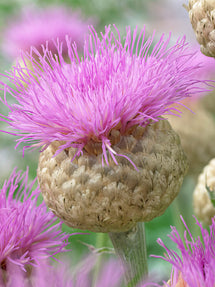Centaurea (Cornflowers)
Centaurea, also known as Cornflowers, unveils mesmerizing and intricate blossoms, equally at home in partial or dappled shade as they are in full sun. Their linear, fringed petals and enchanting blooms create a captivating display in shaded patches, borders, woodland edges, or beneath taller shrubs and trees. These upright-stemmed flowers are a magnet for pollinators, gracing gardens with their presence from May to July each year. Originating from the mountain meadows and woodlands of continental Europe, Centaurea thrives in UK gardens under the right conditions. Their adaptable nature allows them to flourish in containers, gravel gardens, and rockeries, as they are drought-tolerant once established. As hardy, herbaceous perennials, they mature to a height and spread of 45-60cm, favoring moist, well-drained soil in either full sun or partial shade.
Showing 1 - 1 in 1 items
Some interesting facts about Centaurea...
- Historical Symbolism: Cornflowers have a rich historical significance and are associated with folklore and myths. They have been used as symbols of love, luck, and protection against evil spirits.
- National Flower: The Cornflower (Centaurea cyanus) is the national flower of Estonia, symbolizing the country's natural beauty and cultural heritage.
- Medicinal Uses: Centaurea species have been traditionally used in herbal medicine for various purposes, including treating eye infections and inflammation.
- Attracting Pollinators: The vibrant blue color of Centaurea flowers attracts pollinators such as bees, butterflies, and hummingbirds, enhancing biodiversity in the garden.
- Versatile Garden Plant: Cornflowers are versatile plants that can be grown in garden borders, meadows, wildflower gardens, and containers, adding a pop of color and charm.
- Dyeing Properties: Historically, Cornflowers were used to create natural blue dye for textiles and to enhance the color of food and drinks.
- Annual and Perennial Varieties: While the common Cornflower (Centaurea cyanus) is an annual plant, there are also perennial species of Centaurea that return year after year.
- Deer Resistant: Cornflowers are often considered deer-resistant plants, making them a good choice for gardens in areas with deer populations.
- Edible Flowers: The petals of some Centaurea species are edible and can be used to garnish salads or other culinary creations, adding a touch of color and a mild floral flavor.
- Cut Flower Beauty: Cornflowers are popular cut flowers due to their striking appearance and long vase life, making them a favorite for floral arrangements and bouquets.
- Wildlife Habitat: In addition to pollinators, Cornflowers also provide habitat and food for birds and small mammals, contributing to the overall ecosystem in the garden.
- Natural Weed Suppressant: When grown in meadows or wildflower gardens, Centaurea can help suppress the growth of other unwanted weeds, promoting a more natural and sustainable landscape.
